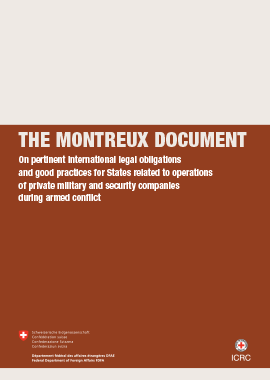Regulation and Oversight
Information about National Regulations and Regional and International Initiatives.
Montreux Document

The Montreux Document on Private Military and Security Companies
The Montreux Document was adopted in 2008 by 17 States and is the result of a joint initiative by Switzerland and the International Committee of the Red Cross (ICRC). By July 2017, it was supported by 54 States and 3 international organizations. It is the first international document to reiterate States’ obligations under international law, in particular IHRL and IHL, with regard to the activities of PMSCs. Without taking a position on the legitimacy of PMSCs, the Montreux Document recalls existing international legal obligations and presents a set of good practices to guide States to take steps at national level to implement their obligations. It is not a legally binding treaty and does not create new legal obligations.
The Montreux Document was designed to promote respect for international humanitarian law and human rights when PMSCs operate in the context of armed conflict. Nevertheless, existing obligations and good practices can also inform post-conflict situations and other comparable situations. The Montreux Document is based on existing provisions in international humanitarian law and human rights law: this means that any State – whether a party to the Montreux Document or not – is required to implement these provisions.
Relevance for CSOs
While the Montreux Document is primarily addressed at States, the good practice in implementing existing international legal obligations that it proposes can help CSOs work with governments in setting up effective monitoring and oversight of PMSCs.
The good practices contained in the Montreux Document deal with concrete issues such as licensing processes, selection criteria or contractual arrangements and allow CSOs to suggest to States a number of effective methods for controlling the activities of PMSCs with which they come into contact.
The Montreux Document also provides CSOs with a benchmark to identify potential gaps in national PMSC legislation. The Montreux Document can thus serve as a guide for CSO activities in raising awareness and contributing to national policies.
For example, Good Practice 10 of the Montreux Document recommends that PMSC personnel receive adequate training ‘to respect relevant national law, international humanitarian law and human rights law’ and that training be tailored to the general mandate of PMSCs and to the mandate specifically assigned to their personnel, citing as example themes:
- Rules on the use of force and firearms;
- International humanitarian law and human rights law;
- Religious, gender and cultural issues, and respect for the local population;
- Handling complaints by the civilian population, in particular by transmitting them to the appropriate authority;
- Measures against bribery, corruption, and other crimes.’
CSOs can build on this good practice to make specific recommendations revising the national legal and policy frameworks.
For more information: www.montreuxdocument.org/resources/

